Nerine Dorman's Blog, page 22
November 17, 2020
The Hobbit, or There and Back Again, by JRR Tolkien, read by Andy Serkis
My first encounter with JRR Tolkien's The Hobbit came when I was around six years old, and my mum picked up a paperback copy from which she read parts of to me. I do admit I was probably a little too young to appreciate this, back then, but I did go on to reading the book on my own when I was about 11 or 12. Which is also when I plunged headlong into The Lord of the Rings and knew from that moment that I wanted to be a fantasy writer.
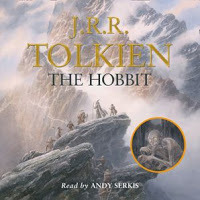
I'm always somewhat baffled when people complain that The Hobbit is boring, but hey, there's no accounting for people's taste. But what I will say to those of you who didn't quite gel with the reading, do give the audiobook narrated by Andy Serkis a try. It's my firm belief that some fiction only truly comes alive as the spoken word, and in this case, The Hobbit is a prime example.
Tolkien is a master of the third person omniscient, so often interrupts the main flow to give a little of his own opinion – and sometimes the references to things from his own time, like football, can be a bit jarring. This is especially the case considering that the conventions of present day fiction favour a limited first- or third-person point of view. So I'm guessing the 'narrator voice' of the author might be off-putting to some readers (though I do believe that they don't quite know how to articulate this, judging by the reviews out there – worth a laugh and an eye-roll if you're trawling to see the one-star reviews for The Hobbit.)
But Andy Serkis as a narrator of this book surpasses himself. His minute details in characterisation, for everyone from Bilbo and Gandalf, to Smaug, and of course the Gollum we all know and love, are an absolute delight. This is the unabridged version of the book, so we're looking at plus minus 10 hours of entertainment, and I'm beginning to wonder if Peter Jackson shouldn't have just stuck to the plot instead of his mangling of the film adaption of the book. Because yes, there is enough content for three movies here, if you look hard enough.
This is most certainly one of my audiobook highlights of the year, and I cannot recommend it enough. Serkis is an absolute treasure and he has without a doubt done justice to JRR Tolkien's legacy with his reading.
November 14, 2020
Ivory's Story by Eugen Bacon
There's a lot to unpack with Eugen Bacon's Ivory's Story, which is due out from NewCon Press which is due for release on December 8, 2020. First off, if you're expecting a narrative that will spoon feed you in stock-standard A-Z fantasy adventure, this is most likely not the novel for you.
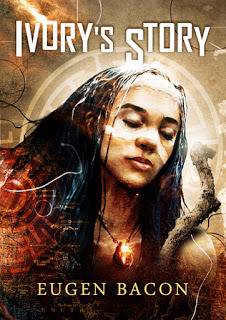
Instead what we have is a vibrant, vital collection of threads that is part murder mystery, folk tale and out-and-out wild fantasy that segues into dream-like sequences. There's a bit of a heroine's journey here, as the main character police detective Ivory Tembo embarks on a quest to not only solve a real-life murder with inexplicable violence in Sydney, Australia, but she must unravel her heritage too.
I'm going to sing praises for Bacon's prose, because her style is colourful and lyrical, and lends itself to being read out loud since she carves out some beautiful imagery with her words. And yet by the same measure this does also obscure the meat and bones of the story so that it is at times difficult to immerse in the narrative, which is at times lost in the vast imaginative leaps that she takes. The short sections within each chapter do create a choppiness to the overall flow, but if each of these is savoured for what it is, it is possible to focus on the isolated cells within the whole that stand out.
Bacon draws heavily on various cultural heritages, blending her telling into a style that is flavoured with both Africa and Australia, in a gloriously culturally postmodern mix. If you're looking out for an epic tale that will certainly stand apart from your usual fare, that is written with great passion and feeling, this one may well hit the mark.
November 11, 2020
Incursion (Catalyst Moon #1) by Lauren L Garcia
I'll start off by saying that Incursion, book 1 of Lauren L Garcia's Catalyst Moon series gave me serious Dragon Age vibes – so much so that I'm sooo tempted to wonder if this is an incredibly well-crafted fic that had its serial numbers filed off. And to tell you how much I loved this book, I immediately went out and purchased book two (which is a rare occurrence for me when I'm considering books for review).
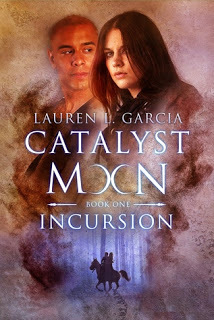
In this world, magic users are reviled and locked up in bastions that are guarded by templ— Sorry, sentinels , who chug lyr haematite that boosts their powers to stop mages from acting out. Honestly, the similarities in the worlds did not bother me so much, because a) I'm a huge fan of Dragon Age and its tie-in fiction and fanfiction and b) Garcia's writing is lovely.
We meet Kali, a mage, who is being transferred to another bastion so that she can have her bad knee looked at (not all mages are equal in their powers, and she's hoping that someone at the bastion will have a better grip on healing magic). Plus, her friend is there, and they haven't seen each other since forever.
Of course no plans go without a hitch, and her party is waylaid by demon-possessed barbarians who pretty much decimate their patrol, leaving only Kali to escape with the young sentinel Stonewall. And her magic has ways of its own that result in a wild escape that sets them practically on the other side of the map. Now they must journey back to the bastion, and learn to trust one another in an often hostile environment.
Meanwhile a mage rebellion is brewing... Of course.
What I love about Garcia's writing is that she brings in the human element with all her characters – we see both mages' and sentinels' points of view, and it's easy to understand where both stand on the divide. All the while I was cheering on those who were able to build bridges rather, but by equal measure curse those too myopic to see the bigger picture – because Garcia lays plenty of seeds hinting at a bigger, brewing danger. If you're looking for a fantasy adventure that focuses on the human elements of magic vs. non-magic conflict, then give Incursion a shot. She has created a varied cast and I'm so curious to see how all the secondary characters' story arcs will pan out.
October 24, 2020
The Pale Horseman (The Last Kingdom #2) by Bernard Cornwell

Considering that I've watched all current seasons of The Last Kingdom TV series I didn't cover any new ground in The Pale Horseman by Bernard Cornwell, except to get a better appreciation of how the screenwriters differed from the events that happen in the novel. And I'm going to assume that some of you may have watched the series so are au fait with the general story, so I'm going to mark the start and end of the spoilers so you can skip ahead if necessary.
SPOILERS
More is made of Uhtred's pirating up and down the coast when he's put in charge of Alfred's paltry fleet set in place to help keep the Danes at bay. This doesn't even have a mention in the series, and adds an entire new dimension to the character and his background. And of course Uhtred, being Uhtred, decides to do some pirating of his own, which brings him into conflict with a king, and is where he meets Yseult, the shadow queen he takes to be his woman, despite him still being married to the overly pious Mildrith.
The pagan Yseult is a far better match for him, in any case, and I know reading of this duplicity in the man might gall those readers who have sensibilities for happily ever afters and true love, but it must be remembered that this was a vastly different time back then, and notions of romance and fidelity as we recognise it are a fairly recent invention. Take into consideration also that Uhtred was raised by the Danes, who had a vastly different outlook on life from the Christians.
We see Uhtred supporting Alfred in his darkest moment, despite the strong temptation to go over to his brother Ragnar. And I have to admit that the battle scene right at the end was so well realised, I was nervous despite knowing how it ends in tragedy. So. Much. Tension.
Also, we see Hilde enter the story. Her friendship with Uhtred is one of the most special, and I am interested to see how this will differ in the books and the series.
END OF SPOILERS
The main theme running through The Pale Horseman is Uhtred grappling with loyalty – he is torn between his Saxon heritage and his Danish upbringing, and this particular story is very much about him striving for sovereignty and yet realising that his goal of regaining Bebbanburg will only come through the swearing of oaths of fealty to one power or another. He is a consummate warrior who has little patience for the complexities of a king's court – which often leads to some delightful interactions. And some small tragedy as Uhtred is his own worst enemy at times.
As always, Cornwell makes the Viking Age with all its rust, blood and strife feel tangible, and his keen observation of people's natures makes this a treat to read. I'm looking forward to the next instalment.
October 22, 2020
The King Must Die (Theseus #1) by Mary Renault
I am forever grateful to the friend who turned me onto Mary Renault's writing. I cut my teeth on The Persian Boy, and have always intended to dip into her other books. Renault also has a connection to my home town – she bought a home in Camps Bay, a beautiful seaside suburb. I get the idea that after World War II she was so over everything.
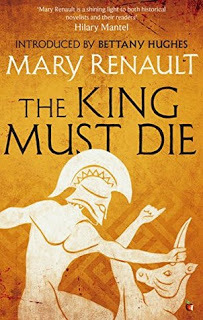
But getting back to The King Must Die (Theseus #1), this is Renault's telling of Theseus's story. Those of us who are au fait with their Greek mythology will know he's the chap who whacked the dreaded minotaur in its labyrinth. Renault effortlessly takes the story out of myth and breathes life into it, spinning a plausible reconstruction of the myth.
Theseus is no Hercules. Short of stature, and the son of a king and a priestess, he has a sense of entitlement and quick wit that more than make up for his shortcomings. Which gets him into sufficient trouble as much as it sees him through sticky situations. Crowned as Eleusian king when he participates in their annual king-sacrificing rite, he knows he has a year to live before he too must make way for the next king.
And even in Eleusis he carves a name for himself, so that he eventually reveals himself to his father Aigeus in Athens, it is on equal footing. Yet this touching reunion is short lived, because Theseus and a number of fellow Athenian youths end up as the tribute for the Cretan bull-dancing. There's even a whiff of magic involved, as Theseus is one of those rare individuals who is sensitive to incipient earthquakes, and perceives himself a scion of the god Poseidon.
Full of courtly intrigue, this story explores the ancient times in a way that is far more vivid than any history book. While the writing is far more formal than what I'm used to, Renault captivates with her achingly beautiful descriptions of the Greek Isles, its people, the architecture, and the culture. Theseus is a catalyst for change in the societies in which he acts – gleefully overturning old customs that have outlived their usefulness and heedless of the damage he causes. So perhaps there is a bit of a trickster in him too. He's not a particularly nice character – some of his actions had me raising my brow – but he's very much a compelling narrator.
If you're looking for historical fiction that will paint ancient Greek myths into life, then The King Must Die will offer a vivid canvas.
October 17, 2020
100 Bushveld Trees by Megan Emmett Parker
My identification of trees remains sketchy at best, so 100 Bushveld Trees by Megan Emmett Parker (photographs by Shem Compion) is a perfect volume for me to dip in a little more. Even though I'm based in the Western Cape, many of the trees mentioned in this book do occur here in gardens and parks, so this is was not a complete loss for me.

While this little book is by no means an exhaustive volume, it's perfect for those of us who do have an interest in the flora of southern Africa and need a departure point to enrich their knowledge. Beautifully laid out, this book gives readers a 101 on the terminology used for the structure of trees, from their overall shape down to their leaves, bark, fruit, flowers and other identifying features.
Thereafter, the sections are divided according to giant trees, spiky trees, simple leaves, compound leaves and more to help pinpoint basic characteristics – which is helpful if you need to narrow down. Each species covered is then introduced in terms of its uses, as well as accompanying characteristics, from bark and leaf to flowers and fruit. Each is also clarified with relevant photos to assist in identification – very useful.
What struck me after reading through this was how incredibly useful many of our species are – not only for the wood, but also in many cases traditional medicines and edible fruit. I certainly came away from this reading with a much greater appreciation for the complexities of our indigenous tree species and the important roles they play within our ecosystems – not only providing shelter but food as well.
October 13, 2020
Dragon Age: Tevinter Nights (Dragon Age #6)
With so much time having elapsed since Dragon Age: Inquisition's release, and with lore-obsessed fans going into a frenzy every time BioWare drops even the slightest morsels hinting at developments in the next game (which at time of writing, they're developing), this anthology of tie-in fiction has come at the right time.
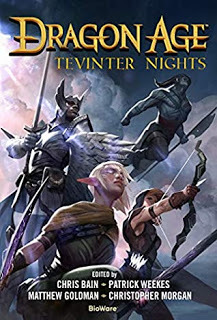
Now the thing with official tie-in fiction, and especially with a short story anthology, is that it's unavoidably always a bit hit and miss in terms of the quality of the content – and Tevinter Nights is no exception. While certain writers are master minds when it comes to structuring the storytelling aspects of a game, they're often not quite as deft in terms of writing fiction. And vice versa, of course.
Tevinter Nights offers an uneven reading experience, but that being said, there were some standout tales collected here. If you're a huge fan of Thedas, and are anxious to return to this world, then you will have plenty of treats here.
Patrick Weekes is known for much of the writing that they've done in Dragon Age: Inquisition, and they have also been carving out a respectable solo career as an author. Their "Three Trees to Midnight" kicks off the anthology in Tevinter, after the Qunari incursion that has resulted in the fall of Ventus. We follow the mage Myrion's point of view, who's been press-ganged into a work crew chopping tree. And he's in a bit of a pickle since the Qunari don't like mages much. To make matters worse, he's shackled to an elf – and the human/elf relations in Tevinter are not all that great. What I loved about this story is that we see a lot of banter between the two that reveals much about Tevinter society. Hijinks ensue when these two unlikely partners escape and must work as a team lest they be recaptured.
"Down Among the Dead Men" by Sylvia Feketekuty takes us to Nevarra with its culture of powerful necromancers, the Mortalitasi. Audric is but a simple guardsman with an unusual appreciation of architecture, and the last he expects is to be bitten by a possessed corpse and dragged head first into an adventure with the mage Myrna. And much to his horror, their quest sees them enter the labyrinthine Great Necropolis. I'm a bit of a sucker for a dungeon crawler, and while there is a bit of a reveal near the end that I didn't quite expect and made a lot of sense, I was quite fond of the dynamics between Audric and Myrna. Overall, this is a pleasing tale.
With a dash of a Lovecraftian flavour, John Epler's "The Horror of Hormak" brings us to two Grey Wardens on a search and rescue mission that sees them, surprise-surprise, enter the Deep Roads and encounter ... well ... Things. There were times when I felt the writing was a bit fast, but as far as typical Dragon Age quests go, this one was familiar turf. And ugh, I hate the Deep Roads.
For those anxious about the official world state post-Trespasser, "Callback" by Lukas Kristjanson offers a somewhat painful return to Skyhold when Sutherland and his friend are entrusted with the task of finding out what manner of evil now lurks in the abandoned fortress. Mired in nostalgia, this story will be fodder for the Solavellans among us to spark much debate. The story also suggests heavily that the official world states sees a disbanding of the Inquisition, with its key players no doubt going underground to face off against the threats offered by the Dread Wolf and the Qunari. I'd say "Callback" was stronger on lore than on style, but I still enjoyed the opportunity to revisit familiar turf.
"Luck in the Gardens" by Sylvia Feketekuty offers us a delightful, first-person point of view from a sassy Crow on an assignment in Minrathous. I loved the inner dialogue, and oh, the OPINIONS. Our Crow is also on the trail of an unusual beast that isn't going to be at all a cakewalk to take out. Oh, and fans of a certain Dorian Pavus need to perk their ears here. That little taste of my dearest friend was wonderful.
"Hunger" by Brianne Battye didn't number among my favourites. Two wardens are on a quest to save a village from marauding monsters. I felt the writing was a bit fast and uneven in places, so I didn't quite get into the story nor did I relate to the characters.
In "Murder by Death Mages" by Caitlyn Sullivan Kelly we return to Nevarra City with Inquisition agent Sidony on a mission for one Cassandra Pengeghast to end a Mortalitasi plot. Of course it's never quite as simple as that. Sidony has a particular disliking for the Machiavellian shenanigans rife in her home, and predictably finds herself caught up right in the midst of it all. I'll admit, not one of my favourite stories. I'd have liked a better immersion in Sidony.
Brianne Battye takes us back to Tevinter in "The Streets of Minrathous", where our protagonist, Neve, is untangling a lingering Venatori plot. We get a glimpse into Tevinter society and a bit of a noir-flavoured murder mystery.
We're back with the Antivan Crows in "The Wigmaker Job", by Courtney Woords, where our dapper two crows enter the den of a Venatori with a penchant for wigs that will make your flesh crawl. If you ever want a reason to dislike certain aspects of Tevinter socity, you'll get plenty of that with this tale. It's fast-paced, has an edge of horror, and I quite liked the dynamics between Lucanis and Illario as they sow havoc in a way that only Crows can. I have a feeling that this story in particular has a few seeds that may grow into something in the next game.
I can see what Lukas Kristjanson was trying to achieve with "Genitivi dies in the End" but the overall execution of this story was lacking. It felt rushed and not thoroughly planned out. It will, however, I suspect, provide Codex material for the next game.
"Herold had the Plan" by Ryan Cormier was another one of the stories that kinda just made me feel a bit 'eh'. There were some nice passages but overall, I found myself skipping pages. The writing felt shallow and rushed at times.
We stay with the Crows in "An Old Crow's Old Tricks" by Arone le Bray, which I felt was more a taster for us to get a better idea of the role Crows play. Lots of murder here, and it reads like a filler piece meant for world building.
"Eight Little Talons" by Courtney Woods is a delight whodunnit. Eight Crow Talons spend the weekend on an island. What could possibly go wrong? I suspect here quite a few morsels for Codex entries was dropped. This was by far one of my favourite stories in the anthology. Woods has a sharp eye for characterisation.
In John Epler's "Half Up Front" a former Altus and her elven partner embark on a mission that pays rather too well. Not suspicious at all, right? A spot of breaking and entering becomes a lot more complicated than expected. The story has a promising start but once again, unravels slightly at the end – characterisation and layering being the aspects that fell flat for me. Yet this is a story that also points Codex entries galore for the next game.
Patrick Weekes closes off things with "The Dread Wolf Take You", from Charter's point of view as she attends a meeting with fellow agents, which gave me many Feelings and Thoughts. I will give no spoilers. The central theme isn't difficult to guess, and this is perhaps the story that will give a tantalising glimpse into the larger world issues we'll be seeing in Dragon Age 4 – escalated conflict between Tevinter and the Qun, with factions within the Qun also causing trouble. Not to mention the fact that an ancient elven god wants to destroy the Veil and the world as we know it.
Let me add that Weekes is a master storyteller, and I'll most certainly be hunting down their writing after this.
Tevinter Nights is very much for the lore-hungry fans. While the writing quality is uneven across the anthology, it nonetheless scratched that itch I'm feeling for new Dragon Age content, especially considering that Inquisition came out in 2014, and I think it's doubtful that apart from the comic books and a few fiction offerings, we haven't seen much else since. Now excuse me while I got pore over "May the Dread Wolf Take You" again.
October 10, 2020
The Sandman (Sandman Audible Original #1) by Neil Gaiman and adapted by Dirk Maggs
A friend of mine back in varsity days introduced me to Neil Gaiman's The Sandman comics by Neil Gaiman, and ever since then I've aimed to tell stories that echo some of the resonance I've felt since reading the comics. And I have always been nervous about possible adaptions of this incredible comic book series. Especially given the track record of so many other adaptions I've seen that didn't quite do justice to the source material.
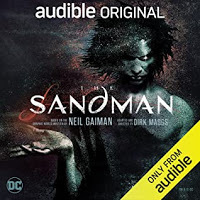
It's also bloody difficult to explain what The Sandman is in brief, because it exists as such a glorious mashup of history, myth and comic book legacy. I'd like to say that it is a story about stories, especially where all the stories we've ever told or have dreamt, intersect in a weird liminal state with history and possible futures. And every time I've dipped into The Sandman, depending on where I'm at in my life, I've had very different takeaways.
At a glance, this is a story about Dream, or Morpheus, the lord of the dream realm, who has been captured by magicians who have rashly endeavoured to capture Death. Sundered from his powers for seventy years, he has to reclaim his tools and, eventually his purpose. He is not alone, however. He is an anthropomorphic representation of the Seven Endless: Death, Dream, Desire, Destruction, Delirium, Destiny and Despair. They are more than gods, and they rule and to a degree ruled by all things.
I've always felt that American Gods was a pale echo of the excellence Gaiman attained in The Sandman, so if you've seen or read the former, then The Sandman will provide a far richer, darker and intoxicating experience. And I wondered how on earth anyone would be able to adapt the series of comics into an audio format. But credit is giving to Dirk Maggs. He's done good. Really good with Gaiman's work.
It was an incredible experience to have familiar stories brought to life in a vivid soundscape. I also cried ugly tears not once, but twice, while listening. Which is quite something considering that all the material is familiar to me. Interestingly enough, I spoke to someone who hadn't read the comic books first, and she admitted that she found The Sandman quite dark, and a bit scary, which I suppose it is. So if horror elements aren't quite your jam, be warned, there's some by the ladles full.
And a word on actors James McAvoy and Kat Dennings, who play Dream and Death respectively – they had a wonderful chemistry, especially in "The Sound of her Wings" which has always been one of my favourite sequences in the comics.
I could probably gush on endlessly about this production. As a long-time fan of everything Neil Gaiman, this is honestly one of the highlights of my reading/listening career. Don't miss this one.
PS, I'm cautiously optimistic that the TV series is going to be peachy keen. And not just because Gaiman is deeply involved in it. Maggs has done an outstanding job with the radio play, showing how it can be done.
PPS, I won't complain if James McAvoy is cast as Dream for the TV series.
September 29, 2020
The Choice Between Us by Edyth Bulbring
Every once in a while a book lands on my desk that I immediately know is an important read, and The Choice Between Us by Edyth Bulbring is one of those books. While at a glance this is a story that's skewed by the lens of two highly unreliable narrators, there's a bigger tale at play in which Bulbring offers readers snapshots of two very different South Africas, her narrators both in some way limited by their environments.
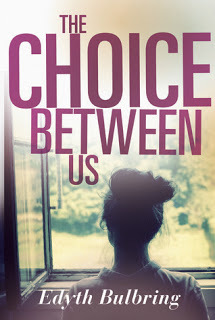
The Choice Between Us alternates cleverly between the lives of two young girls. It's 1963, and we see the world through Margaret's eyes. Her father is a well-to-do doctor, and she has a closer relationship with her nanny than she has with her own mother. Incredibly sheltered and totally naïve, she makes social blunders that ultimately have dire consequences within the toxic stewpot of apartheid-era South Africa. She is very much a product of her time, and reflects many of the social mores you'd expect from someone growing up in these circumstances – a privileged, oft-indulged child, yet I can't help but love her for her obliviousness.
Fifty years later, her relative Jenna goes to help her grand-aunt C-C pack up the old family house, and in doing so uncovers tantalising snippets into the history of her family. A damaged young woman, she in turn damages people around her through her actions. My heart bled for her, and there were times when I was yelling, "No, don't do it!" at the book. Yet watching her arc unfold was also incredibly satisfying, because despite her quirks, Jenna shows a surprising resilience and uncommon wisdom once she decides to take responsibility for her actions.
But what makes this book so powerful in my mind is how it effortlessly juxtaposes two vastly different eras. As a child of the 1980s, I grew up during the tail end of apartheid, so some of what Margaret expresses echoed with me in my family's attitudes from when I was younger. And yet Jenna's great disillusionment and, dare I say it, borderline nihilism, also touched me. This is not so much a story about two young woman, but rather glimpses into the lives of other people viewed through imperfect lenses and coloured with pronounced biases, and therein lies the charm. As always, Bulbring's characterisation is spot on. She understands the multitude of human cruelties all too well, down to the false smiles and barbed comments, to the larger evils. And yet she also offers us a glimmer of hope among the brokenness.
September 16, 2020
Jivaja (Soul Cavern #1) by Venessa M Giunta
I have a sweet tooth for vampires in film and fiction, so naturally Jivaja by Venessa M Giunta caught my fancy. While I do enjoy the standard tropes, it's often refreshing to see an author push the mythos a little further, as Giunta does.
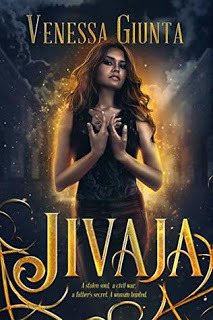
Mecca has a special power – she can see into "cavern" of a living being and steal their power. It's a family gift, or curse, depending on how it's viewed, and until the day she's accosted by a man at a diner, she's never intentionally used it to kill. Until now.
Except the man she's killed is no ordinary man, he's Visci, a breed of vampire, and by killing him, she's essentially painted a massive target on her back. Dragged into this murky world of immortal blood drinkers and their minions, Mecca must learn to use her powers and figure out whether she'll deal with the devil or do her best to remain free. Only things are not at all simple, for as it turns out, her father too is gifted, and he's not going to let the Visci take his daughter without putting up a fight.
Giunta's writing carries a whiff of classic Anne Rice, but it moves quicker, and the characters feel a little more in touch with their world. While the story does take a few chapters to hit its stride, I was nonetheless engaged, and enjoyed a well-realised, well-executed setting with hints at deeper lore. The writing is solid, the author has put a lot of heart into this story, and in Jivaja lays down more than enough threads to continue the saga. The only thread I felt that wasn't developed, was an incipient romantic interest which I didn't feel had sufficient motivation, but it isn't a dealbreaker.
I particularly liked the complicated father-daughter dynamic in this fresh take on the genre, and would most certainly recommend this story to those who cut their teeth on Interview with the Vampire back in the day.



